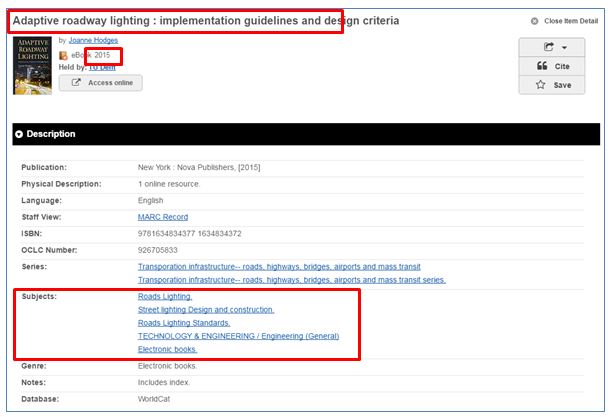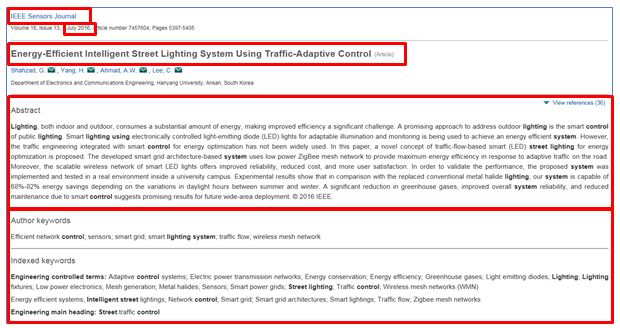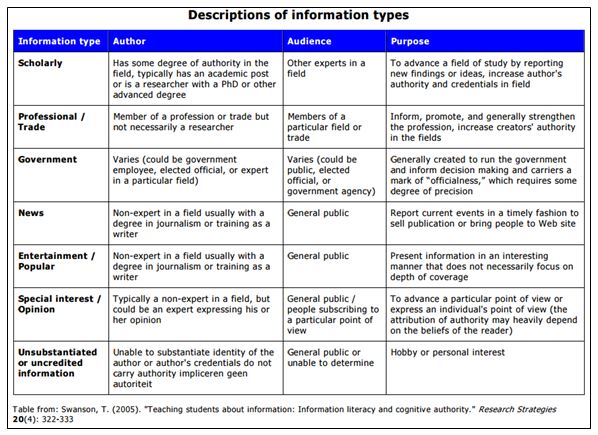Evaluating search results
On this page
Finding information is easy. However, deciding which information to select and use in your own project is more difficult. To evaluate your search results you need to know if the information you have found is really relevant and reliable. Bad search results can lead you, for example, to make the wrong research conclusions or to reinvent the wheel.
Relevance
The relevance of information of your search results is determined by the project you are working on. A book or article can be scientifically sound and well-written, but if its subject is not what you are looking for, it is of no use to you. Decide if a result is relevant by looking at:
- Title
- Keywords
- Abstract or summary (articles)
- Year of publication
- Source (journals/conference proceedings)
Example 1: book
You are searching for information about energy efficient street lighting for traffic and you have found the e-book: “Adaptive roadway lighting: implementation guidelines and design criteria”.
- The title contains a set of specific terms that are most likely relevant for your research topic.
- The first 3 keywords (subjects) indicate that this book is most likely relevant.
- There is no abstract or summary available for this book.
- The year of publication is 2015, so it’s recently published and therefore up-to-date information. Note: older information may also be relevant, depending on your research subject.
- A book is a source. Note that for book chapters, the source is the book itself.
Example 2: article
Next you have found the article:
“Energy-efficient intelligent street lighting system using traffic-adaptive control”.
- The title contains a set of specific terms that are most likely relevant for your research topic.
- The keywords matches the research topic and are most likely relevant. In this case there are two types of keywords:
- Keywords tagged by the author himself.
- Keywords that are tagged by the journal publisher or database, and are, therefore, more systematic.
- The available abstract contains relevant details about the content and information about the research on which the publication is based.
- Year of publication is recent and thus the article is up to date information.
- The source is IEEE Sensors Journal. This journal is about sensors which is a broader scope than your research topic Sensors could be an integral part of (intelligent) street lighting and, therefore, the source is also relevant, for your research topic.
See also: Reading for Research
Reliability
Reliability is a characteristic of the information itself. Can you trust it? Is it based on scientific research or is it someone’s personal opinion? Decide if a search result from a certain information type is reliable by examining the:
- background information on the author(s).
- audience for which the information is intended.
- purpose for which the information was created.
Tip: If you are not sure about the reliability of your source, try to find additional information to confirm the information you are not sure about, or ask a fellow student or teacher. If, after that, you are still not sure about the reliability or scientific quality of the information you have found, is best that you mention this while using the information!
The following table lists different information types with their authors, audiences and purposes:
Examples
Information found online ranges from online scientific journal articles to personal blogs, and from open access research data to sponsored reviews.
The information may be completely reliable or very unreliable. It is not always obvious to which category it belongs, so you need to look at certain criteria to decide whether the information is reliable before you use it.
You need to check:
- the author(s)
- Who are they and what can you find out about them?
- Are they who they say they are?
- Do they work at a reputable research institute or university?
- Be aware that anyone can set up a website and claim to be an expert.
- Sometimes reviewers of publications are also rated. Their position in a ranking list depends on the percentage of helpful reviews and how recent the reviews are.
- the goal of the website
- Was it set up to provide information, to sell things, or to influence public opinion?
- Is it heavily sponsored and full of adverts?
- Is it a lobbying website, for example: for or against airport expansion?
This will probably have implications for the impartiality of the information.
- the target audience:
- If a website is aimed at the general public, is the information comprehensive, or is it a very generalised and (over)simplified version of the truth?
- Does the website provide any links to underlying research?
| Trade Journal | Website | |
|---|---|---|
| E&T (Engineering & Technology)Article: Quantum computer breakthrough announcements are coming thick and fast. But for real-world use, is it really a matter of if rather than when? Published Tuesday, November 8, 2016. Retrieved from https://eandt.theiet.org/content/ articles/2016/11/the-trouble-with-quantum-computing/ | Techpinions.com The tech industry and the Search for a Cancer Cure November 23rd, 2016. Retrieved from https://techpinions.com/the-tech-industry-and-the-search-for-a-cancer-cure/48062 | |
| Author | The author, Ben Skuse, is a professional (freelance) writer and editor of all things science. He has a scientific background and an MSc. in Science Communication, but does not work as a researcher. He writes about other people’s research. Retrieved from https://benjaminskuse.wordpress.com/#slide-3 | According to the website, the author is recognized as one of the leading industry consultants expressing his opinion. |
| Audience | E&T is a magazine and associated website for professional engineers working in all areas of engineering and technology. | The audience is the general public: anyone interested in the technology industry at large. Note that the site is sponsored, so the more readers (clicks), the more profit. |
| Purpose | The purpose of the trade magazine or the author is to give a broad overview of news and developments that could be of interest to its audience (professional engineers). | The goal of the website is to provide the kind of news that will generate traffic on the site: the titles will often promise more than the text can provide. |
| Conclusion | This information is often quite reliable, but superficial. For use in an academic paper, try to find the publications written by the actual researchers themselves. | This information is often both exaggerated and superficial and really not reliable enough for an academic paper. You should verify the given information with another source. |
Relevant links
References
TU Delft Education Support. (n.d.). Descriptions of information types according to Swanson. http://informationliteracy.tudelft.nl/Informatievaardigheden1/ENG/L3E1_Information_types_according_to_swanson.pdf


